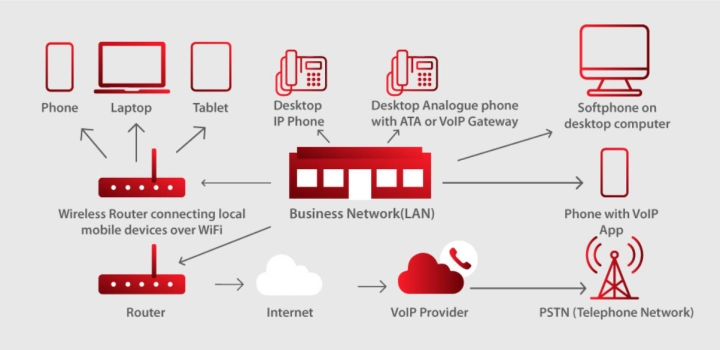How VoIP is Changing the Way Businesses Communicate
With the rapid evolution of digital technology, workplaces have seen seismic changes both to the systems they use and their day-to-day operations. Nowhere is this more obvious than in the field of telecommunications.
Over the past 20 years, Voice over IP (VoIP) has been gradually replacing the public switched telephone network (PSTN) as the voice communications infrastructure for businesses, their suppliers, and customers.
If your business isn’t already using VoIP or you’re looking for a viable telephone service, it’s important to know how VoIP is changing the workplace. Let’s take a look.
What is VoIP and how does it work?
VoIP technology uses a broadband internet connection to make a phone call, rather than using a traditional phone line. It allows you to make a call directly from a computer, an IP phone, or a traditional phone connected to a special adapter.
When a call is placed, a VoIP service breaks the voice down into digital signals that travel across the internet as data – much in the same way an email does. On reaching their destination, signals are repackaged and the speaker’s voice is heard by the receiver, in a way that sounds no different to a traditional telephone conversation.
This service can be delivered via a cloud-based system or via an onsite solution.
More businesses than ever are switching to VoIP and for some very good reasons.
(Perceived) Limitations of VoIP
Despite the obvious benefits, there are still factors making businesses reluctant to move to a VoIP service. But a lot of the reservations surrounding VoIP are based on historical experiences from when limitations in the technology inhibited its functionality.
Reservations regarding audio quality were a real concern when VoIP was in its infancy. Nothing quite matched up to the reliable sound produced by those much-trusted physical phone lines.
VoIP was thought to be inferior and costly compared to existing telephone systems and was mainly used by tech hobbyists who were interested in novel ideas – your ‘early adopters’.
With the broadband industry revolutionized, however, everything has changed. VoIP now has advanced technologies in place to provide perfect call quality.
As the current and evolving technology brings enhanced performance, easy installation and stress-free migration, the benefits far outweigh any drawbacks that VoIP may present.
VoIP also offers the foundations for a fully unified communications platform, which make businesses more communicative, collaborative, and free to focus on their company goals.
How can a business migrate to VoIP?
On-site VoIP
While VoIP is a no-brainer for many businesses in search of a viable telephone service, most established businesses will already house some sort of legacy phone system.
This, however, is not a limitation for VoIP as there are several ways the service can be operated, allowing all businesses to get on board.
For those with a legacy system, one option is to deploy VoIP onsite. This means installing the software on company servers and keeping control of the system in-house.
A limitation of onsite service, however, is that it still heavily relies on both hardware and system maintenance, both of which present large and recurring costs that must be budgeted for.
Cloud-based solutions
The alternative to onsite VoIP installation is the use of a cloud-based platform, otherwise known as hosted VoIP or hosted PBX.
As the name would suggest, hosted VoIP is deployed outside of an organization. Rather than maintaining phone system software on a PBX in the office, businesses subscribe to another company’s data centre to do this for them.
With increased mobility, cost reduction, less hardware, and ease of scalability, cloud-based VoIP is the game-changer of voice communications and it will only continue to improve.
Hybrid VoIP
For businesses with a legacy telephone system, and who might be considering an on-site VoIP service, there is the option to use the two together. This way, you benefit from the advantages of advanced VoIP technology and pave the way for increased use in the future.
Businesses can migrate to a hybrid telephone system where they use a VoIP cloud-based solution but make calls with their existing telephone hardware. This way, old systems can be repurposed but without the need to install in-house hardware or software.
 The Future of VoIP
The Future of VoIP
With the 5G network entering the mainstream, ultrafast mobile internet will become even more affordable. This will see an increase in the use of mobile unified communication. Businesses will increasingly use app-based virtual numbers for calls, conferencing, and team meetings.
Artificial intelligence (AI) is also going to transform customer experiences. Customers are accustomed to virtual assistants such as Amazon’s Alexa in their daily lives. AI will continue to make call centers more efficient by quickly answering common questions and working on automated tasks in the background.
The day has finally come to say goodbye to the plain old telephone system – affectionately known as POTS. VoIP has well and truly changed the face of business communications, and watch this space – there’s a lot more to come.
Author bio: Sam O’Brien is the Senior Website Optimization & User Experience Manager for EMEA at RingCentral, a global UCaaS systems provider. Sam has a passion for innovation and loves exploring ways to collaborate more with dispersed teams. He has written for websites such as BambooHR and Vault.
Email: sam.obrien@ringcentral.com







